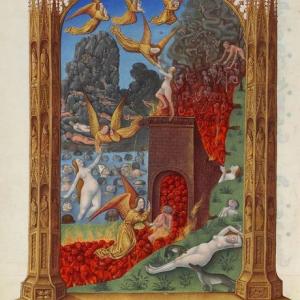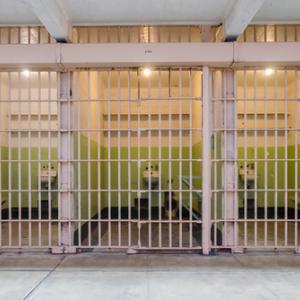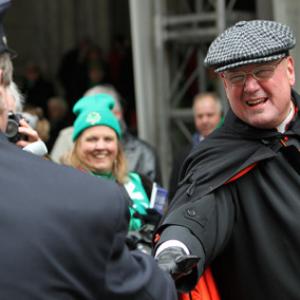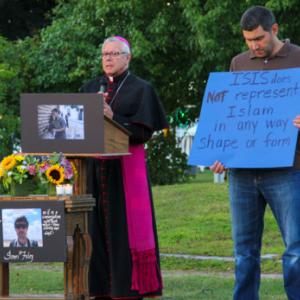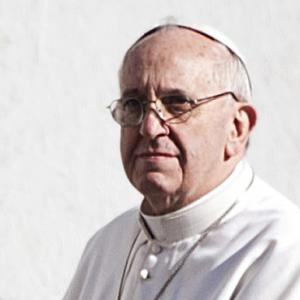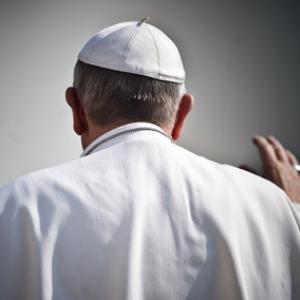David Gibson is an award-winning religion journalist, author, filmmaker, and a convert to Catholicism. He came by all those vocations by accident, or Providence, during a longer-than-expected sojourn in Rome in the 1980s.
Gibson began his journalistic career as a walk-on sports editor and columnist at The International Courier, a tiny daily in Rome serving Italy's English-language community. He then found work as a newscaster across the Tiber at Vatican Radio, an entity he sees as a cross between NPR and Armed Forces Radio for the pope. The Jesuits who ran the radio were charitable enough to hire Gibson even though he had no radio background, could not pronounce the name "Karol Wojtyla" (go ahead -- try it) and wasn't Catholic --- at the time.
When Gibson returned to the United States in 1990 he returned to print journalism to cover the religion beat in his native New Jersey for two dailies and to write for leading magazines and newspapers in the New York area. Among other journalism prizes, Gibson has won the Templeton Religion Reporter of the Year Award, the top honor for journalists covering religion in the secular press, and has twice won the top prize writing on religion from the American Academy of Religion.
Gibson currently writes for Religion News Service and until recently was covering the religion beat for AOL's Politics Daily. He blogs at Commonweal magazine, and has written two books on Catholic topics, the latest a biography of Pope Benedict XVI. He would like to write another -- but can’t seem to find the time.
He has co-written documentaries on early Christian and Jewish history for CNN, and recently worked on a March 2011 History Channel special on the Vatican. He currently has several other film projects in development. Gibson has written for leading newspapers and magazines, including The New York Times, Newsweek, The Wall Street Journal, New York magazine, Boston magazine, Fortune, Commonweal, America and, yes, The Ladies Home Journal.
Gibson is a longtime member of the Religion Newswriters Association. He and his wife and daughter live in Brooklyn.
Posts By This Author
Pope Francis Has Conservatives Talking Schism. But a Split Is Easier Said Than Done
Many conservative Catholics have long viewed Pope Francis with suspicion thanks to his effort to shift the church’s focus away from a culture war agenda and toward a more welcoming approach and a greater emphasis on serving the poor.
But last month’s controversial Vatican summit on the modern family, with the push by Francis and his allies to translate that inclusive view into concrete policies on gays and divorced and remarried Catholics, for example, seems to have marked a tipping point, with some on the right raising the specter of a schism — a formal split that is viewed as the “nuclear option” for dissenters.
New York Times columnist Ross Douthat, a Catholic and a conservative, crystallized the peril in an Oct. 25 column warning the pope not to “break the church” to promote his goals, saying that if Francis continues to alienate conservative Catholics it could lead to “a real schism.”
Douthat had raised the possibility of “an outright schism” earlier this year, as well, and his warnings have been echoed by a number of other church leaders and commentators. The anxiety on the right has also drawn increasing media speculation about the possibility of conservatives splintering off.
So is a schism, with its echoes of medieval debates and heretics burning at the stake, a realistic possibility? And can an independent Catholic church be successful in the modern world?
Protestant Theologians Reconsider Purgatory
This Nov. 2, on what is known as All Souls’ Day, Roman Catholics around the world will be praying for loved ones who have died and for all those who have passed from this life to the next. They will be joined by Jerry Walls.
“I got no problem praying for the dead,” Walls says without hesitation — which is unusual for a United Methodist who attends an Anglican church and teaches Christian philosophy at Houston Baptist University.
Most Protestant traditions forcefully rejected the “Romish doctrine” of purgatory after the Reformation nearly 500 years ago. The Protestant discomfort with purgatory hasn’t eased much since: You still can’t find the word in the Bible, critics say, and the idea that you can pray anyone who has died into paradise smacks of salvation by good works.
The dead are either in heaven or hell, they say. There’s no middle ground, and certainly nothing the living can do to change it.
Many Catholics don’t seem to take purgatory as seriously as they once did, either, viewing it as fodder for jokes or as the “anteroom of heaven,” an unpleasant way station that is only marginally more appealing than hell.
But Walls is a leading exponent of an effort to convince Protestants — and maybe a few Catholics — that purgatory is a teaching they can, and should, embrace. And he’s having a degree of success, even among some evangelicals, that hasn’t been seen in, well, centuries.
Pope Francis Blasts Supermax Prisons as ‘Torture’
Pope Francis said Oct. 23 that keeping inmates isolated in maximum security prisons is “a form of torture,” and called life sentences “a hidden death penalty” that should be abolished along with capital punishment.
“All Christians and people of good will are called today to struggle not only for abolition of the death penalty, whether legal or illegal, and in all its forms, but also to improve prison conditions, out of respect for the human dignity of persons deprived of their liberty,” the pope told delegates from the International Association of Penal Law.
“And this I connect with life imprisonment,” he continued. “Life imprisonment is a hidden death penalty.”
The pope noted that the Vatican recently eliminated life imprisonment from its own penal code, though that move was largely symbolic.
In the wide-ranging address, Francis denounced practices that are widespread in many regions of the world, such as extrajudicial executions and detentions without trial, which he said account for more than half of all detentions in some countries.
Francis also denounced corruption in penal systems, calling it “an evil greater than sin.”
7 Lessons from the Vatican’s Wild and Crazy Synod on the Family
Pope Francis and senior Catholic leaders wrapped up their two-week Vatican summit on the challenges of modern family life on Oct. 19 without reaching a consensus on a number of hot-button topics. So where does that leave Francis’ papacy? And the church?
Here are seven takeaways:
1. Hard-liners won the battle
A midpoint status report on the debate among some 190 cardinals and bishops was described as a “pastoral earthquake” because of its unprecedented (for Catholic churchmen) language of welcome of and appreciation for gay people, as well as divorced-and-remarried Catholics and cohabiting couples.
The media tsunami over that apparent breakthrough panicked conservatives, who waged an intense public and private campaign to make sure none of that language — apparently favored by Francis himself — made it into the synod’s final report. They succeeded, and even the few watered-down paragraphs on gays and remarried Catholics did not reach the two-thirds threshold needed for formal passage.
Hard-liners claimed victory, and headlines spoke of Vatican “backtrack” and a “resounding defeat” for Francis that left his papacy “weakened.”
Pope Paul VI Is Almost a Saint: Here Are 4 of His Biggest Legacies
As he wraps up a Vatican meeting marked by sharp debates over sex and morality, Pope Francis on Oct. 19 will honor one of his most controversial predecessors by beatifying Pope Paul VI, who is most famous for reaffirming the Catholic Church’s ban on artificial contraception.
Beatification puts Paul one step shy of formal sainthood. The move might seem out of step with Francis’ pastoral approach given that Paul’s birth control ruling, in the 1968 encyclical “Humanae Vitae,” set the stage for the culture wars that overtook Catholicism after Paul died in 1978.
A wide swath of Catholics, especially in the U.S. and Europe, were furious over Paul’s decision. They were convinced that the ban would be lifted and that Paul was shutting down the reforms that had begun a few years earlier with momentous changes adopted by the Second Vatican Council.
Many conservatives, on the other hand, hailed “Humanae Vitae” for reasserting traditional doctrine, and the division foreshadowed the deep splits that have played out even in this month’s high-level synod in Rome — a polarization that Francis says he wants to overcome.
Yet Francis is trying to accomplish that goal by focusing not so much on “Humanae Vitae” but on Paul VI’s many other groundbreaking, though often overlooked, contributions:
Pope Francis Wanted Open Debate. With Clashing Cardinals, He’s Got It
Leading up to a Vatican summit on family life that Pope Francis opens on Oct. 5, high-ranking churchmen have fiercely debated church teaching — and criticized each other — in sharp exchanges that offer a ringside seat to the kind of battles that Rome used to keep under wraps.
But amid all this verbal sparring, the opposing camps have found one point of consensus: Airing their differences is good for the Roman Catholic Church.
“Everybody is free to express his opinion. That is not a problem for me,” Cardinal Walter Kasper, a German theologian who has emerged as the point man for the reformists, said in an interview published Sept. 29 in America magazine.
“The pope wanted an open debate, and I think that is something new because up to now often there was not such an open debate. I think that’s healthy and it helps the church very much.”
A day later, Cardinal Raymond Burke, an American who heads the Vatican’s highest court and a vocal exponent of the conservative camp opposing Kasper, spoke to reporters to toss back a few barbs. But he, too, praised the frankness of the exchanges.
US Cardinal Raymond Burke Mounts Defense on Catholic Teaching on Divorce
Public disagreements over whether the Roman Catholic Church can change its teachings on Communion for remarried Catholics are growing sharper on the eve of a major Vatican summit, with conservatives led by U.S. Cardinal Raymond Burke making another push against loosening the rules.
In a conference call with reporters on Sept. 30, Burke, who currently heads the Vatican’s high court, singled out the leading proponent of reforms, German Cardinal Walter Kasper, and his claims that critics of his proposals are really attacking Pope Francis.
Kasper has said that the pope supports his efforts to find ways to fully reintegrate divorced and remarried Catholics into church life. The proposals have become a prime focus of the upcoming Vatican meeting, called a synod, which will convene on Oct. 5 for two weeks to consider changes in family life in the modern world.
“I find it amazing that the cardinal claims to speak for the pope,” said Burke, the former archbishop of St. Louis, speaking from Rome. “The pope doesn’t have laryngitis. The pope is not mute. He can speak for himself. If this is what he wants, he will say so.”
Why Chris Christie and Jeb Bush Were Snubbed by Social Conservative Leaders
New Jersey Gov. Chris Christie and former Florida Gov. Jeb Bush were not invited to a major gathering of social conservatives in Washington last weekend in what was viewed as a serious snub of two men considered prominent Republican presidential contenders for 2016.
“They were not invited this year because they just weren’t on the top of the list in terms of what they are doing right now and whether or not it was relevant to the values voters and who they want to hear from,” said Tony Perkins, head of the Family Research Council and chief organizer of the Values Voter Summit, which opened on Friday and ended Sept. 28.
“They shouldn’t take it the wrong way,” Perkins told David Brody of the Christian Broadcasting Network in an interview taped on Friday.
But in his report, Brody said the two men had been “snubbed” and that’s not good news for any presidential aspirations they may harbor.
The Values Voter Summit is the pre-eminent venue for GOP candidates who hope to showcase their bona fides to the crucial conservative Christian bloc, and Christie and Bush — the elder brother of former President George W. Bush — are seen as Republicans who could appeal to the center of the electorate but who have not won the hearts of social conservatives.
Chicago Meets Its New Archbishop as the ‘Pope Francis Effect’ Sets In
When Spokane Bishop Blase Cupich got a call 10 days ago with the news that Pope Francis had chosen him to be the next archbishop of Chicago — the pontiff’s most important U.S. appointment to date — he was so taken aback that he couldn’t speak for a few moments.
“To say that I was surprised doesn’t come close to the word I would use,” Cupich said Sept. 20 at a news conference in Chicago introducing him as the successor to Cardinal Francis George, who is 77 and battling cancer.
Asked by reporters how long it took for the reality of his appointment to sink in, Cupich smiled and said, “It’s still sinking in.”
A lot of other Catholics are trying to absorb the news as well, just as surprised that Francis picked the 65-year-old Cupich, who had been considered a long shot by many Vatican handicappers. They were also pleased, or concerned, that the pope had evidently chosen a bishop who shared his own emphasis on listening to the flock and caring for the poor.
“I think that he” — Francis — “sent a pastor, not a message,” Cupich told reporters.
New Jersey Nun on the Path to Sainthood
New Jersey is often dismissed as a cultural wasteland of traffic jams and suburban sprawl, mobster graveyards and lost dreams — source material for native son rockers like Bruce Springsteen and Jon Bon Jovi.
But soon the state may also be known as home of the latest American saint, a Bayonne-born nun who is to be beatified in Newark next month.
The beatification of Sister Miriam Teresa Demjanovich, who died in 1927 at the age of 26, puts her one step away from formal canonization.
If Demjanovich does make the final hurdle, she would become just the second person born in the U.S. ever to be named a saint, and it would give New Jersey something to brag about — albeit humbly, no doubt.
Catholic League Drops Out of St. Patrick’s Day Parade Over Row About Gays
After organizers agreed to allow a gay and lesbian group to march, William Donohue of the Catholic League announced that his organization would not take part in next year’s popular celebration of Irish-American culture, New York’s St. Patrick’s Day parade.
Donohue said the parade organizers had “betrayed” him by promising that an anti-abortion group would be allowed to participate if a gay group were given a permit. But he claimed the committee later reversed itself and said abortion opponents would not be marching next year.
“They not only told me one thing, and did another, they decided to include a gay group that is neither Catholic nor Irish while stiffing pro-life Catholics,” Donohue said in a statement issued Sept. 11. “This is as stunning as it is indefensible.”
The parade organizers had sent mixed signals about whether an anti-abortion group would be marching in the parade.
Regensburg Redux: Was Pope Benedict XVI Right About Islam?
Eight years ago this Sept. 12, Pope Benedict XVI delivered a lecture at the University of Regensburg in Bavaria in which he seemed to diagnose Islam as a religion inherently flawed by fanaticism.
It was an undiplomatic assertion, to say the least — especially coming a day after the 9/11 anniversary — and it sparked an enormous outcry among Muslims and came to be seen as one of a series of missteps that would plague Benedict’s papacy until he resigned last year.
Now, with the Islamic State on the march in the Middle East, leaving a trail of horrifying brutality and bloodshed that has shocked the world, some of Benedict’s allies on the Catholic right are saying, in effect, “He told you so.”
“Regensburg was not so much the work of a professor or even a pope,” wrote the Rev. Raymond de Souza in a column for the National Catholic Register, a conservative publication. “It was the work of a prophet.”
New ‘Nuns on the Bus’ Tour to Tackle Political ‘Dark Money’
This time it’s the Catholic sisters versus the Koch brothers.
That’s one way to look at the upcoming “Nuns on the Bus” tour, which hits the road Sept. 17 for the third time in three years, a monthlong trip though 10 key U.S. Senate battleground states to campaign against the influence of outside money on politics.
The issue has come to be identified with the wealthy industrialist brothers Charles and David Koch, whose huge contributions to conservative political causes have raised concerns about the role of “dark money” on elections.
The spigot for such undisclosed donations, which can be made by unions as well as corporations, was opened by the controversial 2010 Citizens United Supreme Court decision. That was followed by another 5-4 ruling in April of this year, McCutcheon v. Federal Election Commission.
Are Catholic Conservatives Turning on Cardinal Timothy Dolan?
Cardinal Timothy Dolan’s positive reaction to this week’s decision by organizers of New York’s annual St. Patrick’s Day parade to allow gay groups to march under their own banners initially drew charitable responses in many Catholic Church circles.
But it didn’t take long for conservative church critics to turn.
After initially signaling his grudging acceptance, William Donohue of the Catholic League came back with a revised view when he realized that more than one gay group could be allowed to march in the future.
“The goal of these activists, supported by the corporate elite, is to neuter the religious element of the parade,” Donohue said. “This is an Irish-Catholic parade, and if what comes after the hyphen is cut, so will the parade’s support, beginning with the Catholic League.”
Gay Groups Joining St. Patrick’s Parade is All Right with N.Y. Cardinal Dolan
After years of strong resistance, organizers of New York’s St. Patrick’s Day parade on September 3 said that gays and lesbians will be allowed to march under their own banner for the first time, and Cardinal Timothy Dolan—the parade’s grand marshal next March—has welcomed the move.
The decision is another sign of how quickly changing public attitudes toward gay people have pushed changes in state laws, government policies, and the practices of private entities.
Dolan’s positive response may also point to a shifting dynamic within the Catholic Church on gays and lesbians since the election of Pope Francis last year. Francis has made it clear he wants church leaders to highlight Catholicism’s outreach to the poor and vulnerable rather than always fighting culture war issues on gay marriage and the like.
The church’s teachings on gays lesbians have not changed, as was evident this week when two teachers at a Catholic high school in St. Louis were fired when administrators learned the women were married, and a teacher at a Catholic high school in suburban Detroit who is a lesbian said she was fired when she became pregnant.
But the Saint Patrick’s Day Parade, which is not run by the church, allows for some wiggle room. Dolan said Wednesday that the parade committee that operates the annual event “continues to have my confidence and support.”
“Neither my predecessors as Archbishop of New York nor I have ever determined who would or would not march in this parade … but have always appreciated the cooperation of parade organizers in keeping the parade close to its Catholic heritage,” he continued.
Dolan concluded by praying “that the parade would continue to be a source of unity for all of us.”
Is James Foley a Martyr?
From the moment news broke that U.S. journalist James Foley had been beheaded by Islamic State extremists in the Middle East, many Christians, especially Foley’s fellow Catholics, began calling him a martyr, with some even saying he should be considered a saint.
Yet that characterization has left others uneasy, and the discussion is raising larger questions about what constitutes martyrdom.
Foley’s parents seemed to validate the martyrdom label when his father, John, spoke at an emotional news conference outside the family’s New Hampshire home and said he and his wife “believe he was a martyr.” Foley’s mother, Diane, added that her son “reminds us of Jesus. Jesus was goodness, love — and Jim was becoming more and more that.”
In an interview two days later with Katie Couric, Foley’s younger brother, Michael, recounted how Pope Francis had called the family to console them and in their conversation “referred to Jim’s act as, really, martyrdom.”
Numerous commentators had already picked up on that idea, holding Foley up not only as a witness to the Christian faith but as a spur for believers in the West to take more seriously the plight of Christians in Iraq and elsewhere in the Middle East who are being persecuted to a degree that some say is comparable to genocide.
But in the Catholic Church, determining whether someone is a martyr is not so easy. Historically, two conditions must be met.
US Must 'Destroy' Islamic State, Say Religious Conservatives
A coalition of more than 50 religious leaders, led by mostly conservative Catholic, evangelical, and Jewish activists, is calling on President Obama to sharply escalate military action against Islamic extremists in Iraq. They say “nothing short of the destruction” of the Islamic State can protect Christians and religious minorities now being subjected to “a campaign of genocide.”
“We represent various religious traditions and shades of belief,” the petition reads. “None of us glorifies war or underestimates the risks entailed by the use of military force.”
But they say the situation is so dire that relief for these religious communities “cannot be achieved apart from the use of military force to degrade and disable” the Islamic State forces.
The petition was organized by Robert P. George, a prominent Catholic conservative and Republican activist, and he was joined by a range of other leaders, many of whom are known for their hawkish views on foreign policy.
On Iraq Pope Francis' Message of Peace Meets Realities of War
VATICAN CITY — As he dispatches a top aide to war-torn Iraq this week, Pope Francis made his most impassioned plea yet for the world to halt the “slaughter” of Christians and other religious minorities by Islamic extremists.
“The news coming from Iraq leaves us incredulous and appalled,” Francis told pilgrims in St. Peter’s Square on Sunday, as he cataloged the brutal “violence of every kind” that has driven hundreds of thousands of people from their homes and left women and children dead and dying.
“All this seriously offends God and seriously offends humanity,” the pontiff declared. “You cannot bring hatred in the name of God. You cannot make war in the name of God!”
Yet even as Francis called on the international community to find “an efficient political solution that can stop these crimes,” the Vatican also tried to make peace with the idea that U.S. military strikes that began last week were necessary and working.
No 'Pope Francis Effect' on Capitol Hill Gridlock
How partisan and unproductive is the current Congress?
The epitome of its dysfunction may have arrived with last week’s wrap-up before a five-week summer recess, as House Republicans failed to pass their own scaled-back bill on the border children crisis on Thursday. Realizing how bad that looked, lawmakers returned on Friday to pass an even more severe bill that had no chance of going anywhere.
But a better gauge of the problem may be the fact that despite the almost universal popularity of Pope Francis, the House of Representatives was unable to muster enough bipartisan support to pass a resolution lauding Francis’ election — nearly 18 months ago.
The bill, H.Res. 440, seems straightforward, as it aims to congratulate Francis on his March 2013 election and recognize “his inspirational statements and actions.”
Jesuits Tell Their Alumni in Congress: Protect Border Children
American Jesuits are pushing members of Congress who were educated at the Catholic order’s schools to pass aid for thousands of refugee children who have surged across the border in Texas in recent months, calling proposals to swiftly deport them “inhumane and an insult to American values.”
“I ask you, as a leader, a parent, and a Catholic, to uphold an American tradition of which we are all proud,” the Rev. Thomas Smolich, head of the U.S. Jesuit conference, wrote to House Speaker John Boehner and 42 other House members who graduated from Jesuit high schools and colleges.
“We must welcome the refugee, the victim of trafficking, the child who has been abused or abandoned,” Smolich wrote in the July 29 letter. “Let us follow in the footsteps of Jesus when he said, ‘Let the children come to me, and do not prevent them; for the kingdom of heaven belongs to such as these.’”
Since last fall, more than 57,000 unaccompanied minors have flooded across the U.S.-Mexico border, mainly in south Texas, most of them from El Salvador, Guatemala and Honduras.
The migrants are often driven out by endemic violence in their home countries and drawn to the U.S. by prospects of better economic opportunities or the chance to reunite with their families.
But the influx has created a humanitarian crisis that has become a political wedge issue.

